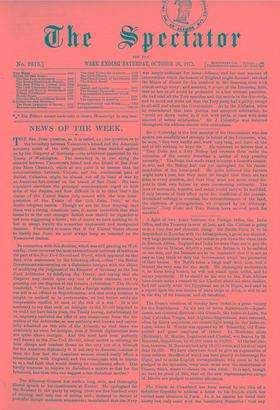In connection with this decision, which was still pending on
Wed- nesday, there occurred the most extraordinary outbreak of malice on the part of the New York Herald and IVorld, which appeared on that date with statements to the following effect,—that " the British Government wascarrying on a diplomatic intrigue with the object of modifying the judgment of the Emperor of Germany as the San Juan Arbitrator by falsifying the Treaty, and saying that the Emperor may decide upon any one of three channels, and by pointing out the disgrace of the Geneva Arbitration." The Herald concluded, "When we find out that a foreign nation's presence on our soil is an offence to Republicanism, and that every occasion is sought to embroil us in controversies, we had better settle the irrepressible conflict at once at the risk of a war." It is not necessary to say that such an intrigue as the Herald imputed to us could not have taken place, the Treaty having, unfortunately for us, expressly excluded the offer of any compromise from the dis- cretion of the Arbitrator, as was perfectly well known and univer- sally admitted on this side of the Atlantic, so that there was absolutely no room for intrigue, even if British diplomatists were not quite above intrigue. And this must have been perfectly well known to the New York Herald, whose motive in uttering its false charge and insolent threat on the very eve of a triumph for the American diplomacy it is not easy to diacover,—unless it were the fear lest the American success should really effect a reconciliation with England, and the consequent wish to impute to us a bad faith that would destroy its conciliatory effect. One hardly ventures to impute so diabolical a motive as that for the falsehood, but then who can suggest a lees diabolical motive ?


































